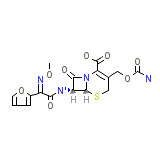Ancef




Ancef Brand names, Ancef Analogs
- Ancef
- Biofuroksym
- Ceclor
- Ceclor CD
- Cedax
- Cefditoren
- Cefizox
- Cefobid
- Cefotan
- Ceftin
- Cefurax
- Cefuril
- Cefuroxim
- Cefuroxime [USAN:BAN:INN]
- Cefuroximo [INN-Spanish]
- Cefuroximum [INN-Latin]
- Cefzil
- Cepazine
- Cephuroxime
- Ceptaz
- Duricef
- Elobact
- Fortaz
- Keflex
- Keftab
- Kefurox
- Kefzol
- Kerurox
- Mandol
- Maxipime
- Mefoxin
- Monocid
- Omnicef
- Oraxim
- Rocephin
- Sharox
- Tazicef
- Vantin
- Velosef
- Zinacef
- Zinacef Danmark
- Zinat
- Zinnat
Ancef Brand Names Mixture
- No information avaliable
Ancef Chemical_Formula
Ancef RX_link
Ancef fda sheet
Ancef msds (material safety sheet)
Ancef Synthesis Reference
Ancef Molecular Weight
Ancef Melting Point
Ancef H2O Solubility
Ancef State
Ancef LogP
Ancef Dosage Forms
Ancef Indication
Ancef Pharmacology
Ancef Absorption
Ancef side effects and Toxicity
Ancef Patient Information
Patients should be counseled that antibacterial drugs including Cefuroxime for Injection USP and Dextrose Injection USP should only be used to treat bacterial infections. They do not treat viral infections (e.g., the common cold). When Cefuroxime for Injection USP and Dextrose Injection USP is prescribed to treat a bacterial infection, patients should be told that although it is common to feel better early in the course of therapy, the medication should be taken exactly as directed. Skipping doses or not completing the full course of therapy may (1) decrease the effectiveness of the immediate treatment and (2) increase the likelihood that bacteria will develop resistance and will not be treatable by Cefuroxime for Injection USP and Dextrose Injection USP or other antibacterial drugs in the future.














